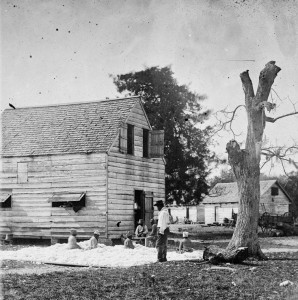150 years ago today The New-York Times reacted to a bill in the Georgia Legislature that would place an extreme fine on commerce with the North. The editorial used the bill’s intent to predict the effect a hostile secession would have on the South’s economy.
The New-York Times ((December 1, 1860):
South and North Retaliatory Laws.
The Legislature of Georgia devoted its session, yesterday, to the consideration of a bill, attaching a fine of $2,000 to the sale of “a bale of cotton or a barrel of apples,” to anybody at the North. The proposition is reported to have occasioned a vehement debate, in which the line between the Secessionists and the Unionists was distinctly drawn.
We are glad to see the measure brought forward at this early stage of the disunion movement, and we should not be at all sorry to see it adopted. The Southern Secessionists rely, with great confidence, on their ability to coerce the North by non-intercourse, into acquiescence in their views and purposes. It will be much better for all parties that they make the experiment before secession, than after it, — for its consequences, if the experiment should unhappily fail, can be much more easily remedied. One of the best things that could possibly happen, — the best, perhaps, for both parties, — would, be a year’s trial of the non-intercourse, policy. If it succeeded, then the South could think of secession. If it failed, they would be more reconciled to their position within the Union.
But aside from this, such a policy as that proposed lacks all provocation on the part of the leading commercial centres at the North — upon which it would mainly take effect — and must therefore excite an indignation proportioned to its gross injustice. This feeling will in due time prompt retaliatory measures. Whatever may be said of the North as a whole, its great commercial cities have been in all extremities submissive even to the extra-constitutional demands of the Southern States, — and it can scarcely be expected that they will forever submit to these passionate and vindictive displays of inconsiderate feeling; or persist in refraining from legislation, the commercial results of which must be simply destructive to the South.
It is not easy to understand that state of mind which leads Southern men to suppose that they can possibly withhold from market, without injury and ruin to themselves, the great staple of their agriculture, on which they depend for everything necessary for their own consumption. Their necessity to sell is ten times as great as ours to buy, and if they were to accomplish, what seems to be the principal dream of their lives, — destruction of all trade with the North and the sale of their cotton to England alone, — they would simply place themselves at the mercy of a single purchaser, who, in the absence of competition, could, and of course would, dictate his own terms. It will indeed be a sad day for the planters when Manchester is rid of the company of Lowell and Philadelphia at the brokers’ table.
The same remark applies to other Southern staples. There is so little, in truth, which the South offers which is indispensable to the North, or which it cannot obtain in other quarters, that no positively hostile legislation is needed in the Northern States to rebut these explosions of Southern folly and malignity. But if the manifold products of Northern mines, forests and workshops were to be placed under restrictions and penalties similar to those proposed in this Georgian law, the condition of the seceding States would indeed be deplorable. They would find by sorry experience that sudden political independence does not necessarily carry with it sudden industrial and commercial independence; and that the currents of trade are not to be diverted with impunity by arbitrary legislation. A long period of helplessness at a time when, if ever, energetic competition with a progressive North would be demanded by sectional pride and interest, would be the inevitable result.
If, therefore, any portion of the South is bent upon disunion, every consideration of policy bids it abstain from all preliminary legislation of this vindictive and suicidal kind. It has everything to gain by maintaining amicable relations with the North; all manner of hazards to incur from provoking angry and resentful feelings. If at its exodus, it attempts to destroy Northern commerce, pursue and persecute Northern citizens, repudiate its debts to Northern traders, and discriminate generally to the disadvantage of Northern men and interests, it may provoke corresponding measures at a crisis when it is least able to contend with them.
It is not to be forgotten, that with the severance of the Union, the thousand inducements to political forbearance which have heretofore governed the great Northern majority must cease to exist. The South has only to destroy the additional inducements offered by commercial self-interest and commercial intercourse, to create a breach, which no subsequent penitence and attempted reparation can entirely close. And in the conflict between hostile legislation at the North and the South there is no occasion to question the issue. It will be a contest between an armed and stalwart giant, and an infant that has not yet learned to go alone.
From the perspective of 150 years later, The Times concern about the effects of non-intercourse seem highly reasonable, but apparently the South was not in the mood for thought experiments or even real experiments.
But non-intercourse raises a question: does anyone know how the North obtained cotton during the Civil War?
Thanks

